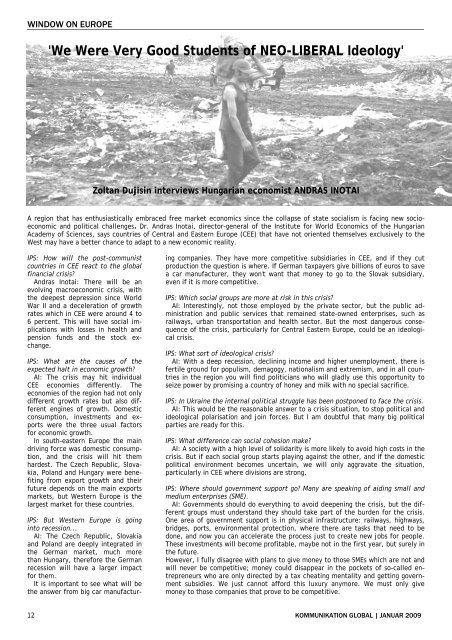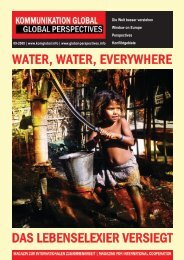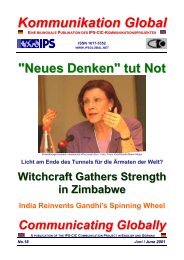GLOBAL PERSPECTIVES | KOMMUNIKATION GLOBAL - 01 | 2009
GLOBAL PERSPECTIVES | KOMMUNIKATION GLOBAL - 01 | 2009
GLOBAL PERSPECTIVES | KOMMUNIKATION GLOBAL - 01 | 2009
You also want an ePaper? Increase the reach of your titles
YUMPU automatically turns print PDFs into web optimized ePapers that Google loves.
WINDOW ON EUROPE<br />
'We Were Very Good Students of NEO-LIBERAL Ideology'<br />
Zoltan Dujisin interviews Hungarian economist ANDRAS INOTAI<br />
A region that has enthusiastically embraced free market economics since the collapse of state socialism is facing new socioeconomic<br />
and political challenges. Dr. Andras Inotai, director-general of the Institute for World Economics of the Hungarian<br />
Academy of Sciences, says countries of Central and Eastern Europe (CEE) that have not oriented themselves exclusively to the<br />
West may have a better chance to adapt to a new economic reality.<br />
IPS: How will the post-communist<br />
countries in CEE react to the global<br />
financial crisis?<br />
Andras Inotai: There will be an<br />
evolving macroeconomic crisis, with<br />
the deepest depression since World<br />
War II and a deceleration of growth<br />
rates which in CEE were around 4 to<br />
6 percent. This will have social implications<br />
with losses in health and<br />
pension funds and the stock exchange.<br />
IPS: What are the causes of the<br />
expected halt in economic growth?<br />
AI: The crisis may hit individual<br />
CEE economies differently. The<br />
economies of the region had not only<br />
different growth rates but also different<br />
engines of growth. Domestic<br />
consumption, investments and exports<br />
were the three usual factors<br />
for economic growth.<br />
In south-eastern Europe the main<br />
driving force was domestic consumption,<br />
and the crisis will hit them<br />
hardest. The Czech Republic, Slovakia,<br />
Poland and Hungary were benefiting<br />
from export growth and their<br />
future depends on the main exports<br />
markets, but Western Europe is the<br />
largest market for these countries.<br />
IPS: But Western Europe is going<br />
into recession...<br />
AI: The Czech Republic, Slovakia<br />
and Poland are deeply integrated in<br />
the German market, much more<br />
than Hungary, therefore the German<br />
recession will have a larger impact<br />
for them.<br />
It is important to see what will be<br />
the answer from big car manufactur-<br />
ing companies. They have more competitive subsidiaries in CEE, and if they cut<br />
production the question is where. If German taxpayers give billions of euros to save<br />
a car manufacturer, they won't want that money to go to the Slovak subsidiary,<br />
even if it is more competitive.<br />
IPS: Which social groups are more at risk in this crisis?<br />
AI: Interestingly, not those employed by the private sector, but the public administration<br />
and public services that remained state-owned enterprises, such as<br />
railways, urban transportation and health sector. But the most dangerous consequence<br />
of the crisis, particularly for Central Eastern Europe, could be an ideological<br />
crisis.<br />
IPS: What sort of ideological crisis?<br />
AI: With a deep recession, declining income and higher unemployment, there is<br />
fertile ground for populism, demagogy, nationalism and extremism, and in all countries<br />
in the region you will find politicians who will gladly use this opportunity to<br />
seize power by promising a country of honey and milk with no special sacrifice.<br />
IPS: In Ukraine the internal political struggle has been postponed to face the crisis.<br />
AI: This would be the reasonable answer to a crisis situation, to stop political and<br />
ideological polarisation and join forces. But I am doubtful that many big political<br />
parties are ready for this.<br />
IPS: What difference can social cohesion make?<br />
AI: A society with a high level of solidarity is more likely to avoid high costs in the<br />
crisis. But if each social group starts playing against the other, and if the domestic<br />
political environment becomes uncertain, we will only aggravate the situation,<br />
particularly in CEE where divisions are strong.<br />
IPS: Where should government support go? Many are speaking of aiding small and<br />
medium enterprises (SME).<br />
AI: Governments should do everything to avoid deepening the crisis, but the different<br />
groups must understand they should take part of the burden for the crisis.<br />
One area of government support is in physical infrastructure: railways, highways,<br />
bridges, ports, environmental protection, where there are tasks that need to be<br />
done, and now you can accelerate the process just to create new jobs for people.<br />
These investments will become profitable, maybe not in the first year, but surely in<br />
the future.<br />
However, I fully disagree with plans to give money to those SMEs which are not and<br />
will never be competitive; money could disappear in the pockets of so-called entrepreneurs<br />
who are only directed by a tax cheating mentality and getting government<br />
subsidies. We just cannot afford this luxury anymore. We must only give<br />
money to those companies that prove to be competitive.<br />
12 <strong>KOMMUNIKATION</strong> <strong>GLOBAL</strong> | JANUAR <strong>2009</strong>















